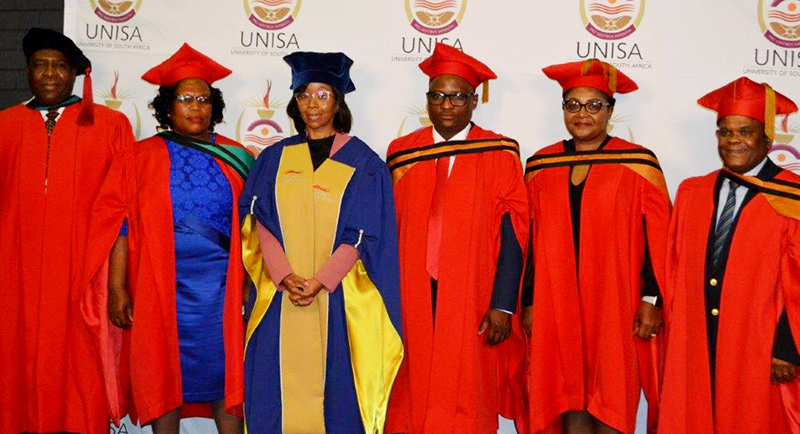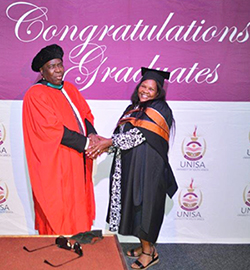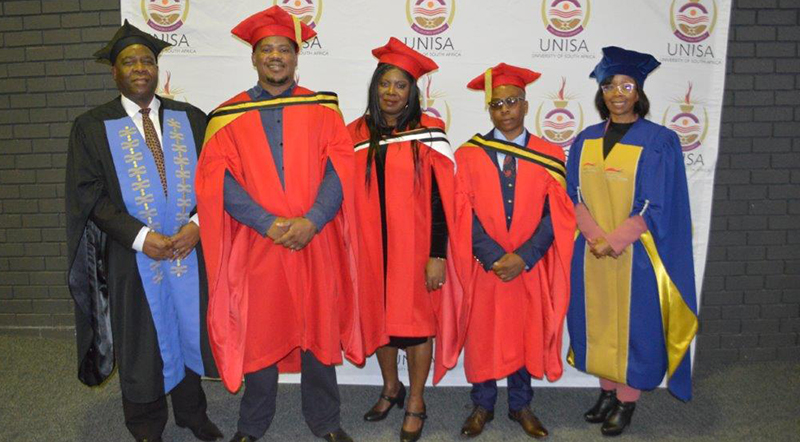News & Events
Unisa Midlands Region congratulates graduates on their success despite a challenging year

Midlands management and the PhD Supervisor for College of Education with some of the conferred PhD degree students From left: Dr Stanley Nhlapo (Centre Manager, Unisa Midlands Region), Mamosa Thaanyane (PhD in Education), Angie Bopape (Acting Regional Director Midlands Region), Jonas Sello Thinane, Molaodi Margaret Matoboko (PhD in Information Sciences, PhD supervisor)
2020 marked the beginning of the COVID-19 pandemic that caught the entire world off-guard. Businesses had to adjust their sails to deal with new realities. Institutions of higher learning were no exception. This is why Unisa could no longer host face-face graduations. Now that the dust has settled, more institutions usually conduct business while adhering to all COVID-19 protocols.

Dr Stanley Nhlapo (Centre Manager,Unisa Midlands Region) with one of our own Midlands Regional staff based In Bloemfontein; Zameka Nogaya (Bachelor of Commerce Honours in Industrial and Organisational Psychology)
This has brought about an opportunity to witness the 2022 cohort of graduates pitching, once again, in their numbers for the graduation ceremonies at the Doxa Deo auditorium in Bloemfontein on Friday, 06 May 2022 and Saturday, 07 May 2022. The last graduation ceremony was momentous as Unisa conferred seven PhDs with several students passing with distinctions. Graduates were delighted to welcome the Unisa chancellor, Dr Thabo Mbeki.
Despite the COVID-19 pandemic and its negative impact on the academic programme across all institutions, Unisa celebrated the sterling job of a cohort of resilient students who managed to complete their studies against all odds. These students were part of the May 2022 face-to-face graduation ceremonies. Unisa takes pride in producing students of such calibre.
The Bloemfontein graduation ceremonies wrapped up on Saturday. The morning and afternoon sessions were devoted to the graduates of almost all colleges. A PhD degree was conferred on Molaodi Margaret Matobako, who received her qualification in Information Science on Saturday morning. Jonas Sello Thinane received his PhD qualification in Theology and Mamosa Thaanyane received her PhD in Education. A handful of students passed with distinction. Kekeletso Mothibeli had six distinctions in her BHonours in Counselling Psychology.
Congratulations to all 2022 graduates and their families, guardians, and those who supported them.
*By Winston Rampedi, Manager: Communication and Marketing, Midlands Region

From left: Ms Angie Bopape (Acting Regional Director- Midlands Region) Midlands management with some of the conferred PhD degree students; Motshweneng Teboho Simon, Mwabsa Mushimbile Mwilima, Sibiya Malusi, Dr Stanley Nhlapo (Centre Manager Unisa Midlands Region)
Publish date: 2022/06/03
